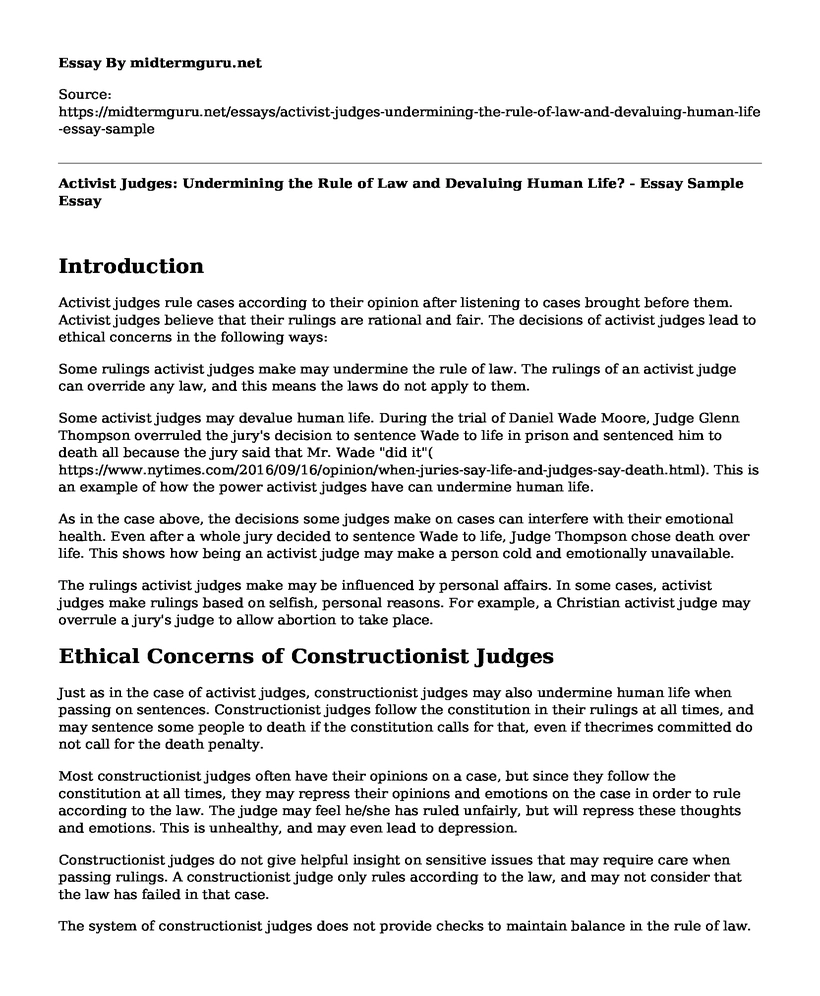Introduction
Activist judges rule cases according to their opinion after listening to cases brought before them. Activist judges believe that their rulings are rational and fair. The decisions of activist judges lead to ethical concerns in the following ways:
Some rulings activist judges make may undermine the rule of law. The rulings of an activist judge can override any law, and this means the laws do not apply to them.
Some activist judges may devalue human life. During the trial of Daniel Wade Moore, Judge Glenn Thompson overruled the jury's decision to sentence Wade to life in prison and sentenced him to death all because the jury said that Mr. Wade "did it"( https://www.nytimes.com/2016/09/16/opinion/when-juries-say-life-and-judges-say-death.html). This is an example of how the power activist judges have can undermine human life.
As in the case above, the decisions some judges make on cases can interfere with their emotional health. Even after a whole jury decided to sentence Wade to life, Judge Thompson chose death over life. This shows how being an activist judge may make a person cold and emotionally unavailable.
The rulings activist judges make may be influenced by personal affairs. In some cases, activist judges make rulings based on selfish, personal reasons. For example, a Christian activist judge may overrule a jury's judge to allow abortion to take place.
Ethical Concerns of Constructionist Judges
Just as in the case of activist judges, constructionist judges may also undermine human life when passing on sentences. Constructionist judges follow the constitution in their rulings at all times, and may sentence some people to death if the constitution calls for that, even if thecrimes committed do not call for the death penalty.
Most constructionist judges often have their opinions on a case, but since they follow the constitution at all times, they may repress their opinions and emotions on the case in order to rule according to the law. The judge may feel he/she has ruled unfairly, but will repress these thoughts and emotions. This is unhealthy, and may even lead to depression.
Constructionist judges do not give helpful insight on sensitive issues that may require care when passing rulings. A constructionist judge only rules according to the law, and may not consider that the law has failed in that case.
The system of constructionist judges does not provide checks to maintain balance in the rule of law. If a constructionist passed a judgement that other activist judges viewed as unjust and appealed it, most often, the constructionist judge's judgement will win against the appeal because they would be backed by the constitution.
References
https://www.nytimes.com/2018/06/14/nyregion/the-96-year-old-brooklyn-judge-standing-up-to-the-supreme-court.html
https://www.nytimes.com/2016/11/01/nyregion/nypd-muslim-lawsuit-settlement.html
https://www.nytimes.com/2016/09/16/opinion/when-juries-say-life-and-judges-say-death.html
Fielding, N. G. (2011). Judges and their work. Social & Legal Studies, 20(1), 97-115.
Cite this page
Activist Judges: Undermining the Rule of Law and Devaluing Human Life? - Essay Sample. (2022, Dec 30). Retrieved from https://midtermguru.com/essays/activist-judges-undermining-the-rule-of-law-and-devaluing-human-life-essay-sample
If you are the original author of this essay and no longer wish to have it published on the midtermguru.com website, please click below to request its removal:
- Human Right in Kurdistan, Saudi Arabia and Syria - Paper Example
- Paper Example on Organized Crime and Human Trafficking
- Essay on Understanding Critical Infrastructure and Border Security
- Paper Example on Colonial Period in Latin America
- Essay Sample on the Great Depression
- Ethics in Business: Utilitarian & Principles-Rights Frameworks - Essay Sample
- Corporations: The Power to Shape Policy and Impact Lives - Essay Sample







